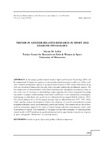Identificador persistente para citar o vincular este elemento:
https://accedacris.ulpgc.es/jspui/handle/10553/7853
| Campo DC | Valor | idioma |
|---|---|---|
| dc.contributor.author | Lavoi, Nicole L. | en_US |
| dc.date.accessioned | 2012-08-11T04:01:05Z | - |
| dc.date.accessioned | 2018-03-08T13:20:17Z | - |
| dc.date.available | 2012-08-11T04:01:05Z | - |
| dc.date.available | 2018-03-08T13:20:17Z | - |
| dc.date.issued | 2011 | en_US |
| dc.identifier.issn | 1886-8576 | en_US |
| dc.identifier.uri | https://accedacris.ulpgc.es/handle/10553/7853 | - |
| dc.description.abstract | In this paper, gender-related trends in Sport and Exercise Psychology (SEP) will be summarized. To begin key aspects of what gender-related research is, and is not will be outlined. Common problematic aspects of gender-related research in SEP will be illuminated, along with two theoretical frameworks that may help overcome traditionally problematic aspects. The first framework is Cultural Studies which blurs and dismantles disciplinary boundaries, where no one truth, way of knowing, or methodology reigns supreme, but where integrated knowledge that leads to complex understandings which make a difference to the communities and marginalized groups or individuals who need it most is desired and encouraged (Silk & Andrews, 2011). The second framework is the Ecological Systems Theory (Bronfenbrenner 1977, 1979, 1993), which specifies human development reflects the influence of several environmental systems including individual, social, environmental, societal and cultural. This seminal theory has influenced how researchers approach the study of human beings and their environments, which varies from culture to culture. The remainder of the paper will provide a summary of selected genderrelated trends in SEP including the gendered physical activity gap, females in positions of power in sport, and gender “differences” in coaching science. | en_US |
| dc.format | application/pdf | es |
| dc.language | eng | en_US |
| dc.relation.ispartof | Revista Iberoamericana de Psicologia del Ejercicio y el Deporte | en_US |
| dc.source | Revista Iberoamericana de Psicología del Ejercicio y el Deporte. Sevilla : Wanceulen, 2006 [ISSN 1886-8576], año 2011, v. 6 (2), p. 269-281 | en_US |
| dc.subject | 61 Psicología | en_US |
| dc.subject.other | Gender in sport | en_US |
| dc.subject.other | Sport and gender | en_US |
| dc.subject.other | Cultural competence | en_US |
| dc.title | Trends in gender-related research in sport and exercise psychology | en_US |
| dc.type | info:eu-repo/semantics/article | en_US |
| dc.type | Article | en_US |
| dc.compliance.driver | 1 | es |
| dc.identifier.absysnet | 537108 | - |
| dc.identifier.crisid | - | - |
| dc.investigacion | Artes y Humanidades | en_US |
| dc.rights.accessrights | info:eu-repo/semantics/openAccess | es |
| dc.type2 | Artículo | en_US |
| dc.identifier.external | - | - |
| dc.identifier.ulpgc | Sí | es |
| dc.description.sellofecyt | Sello FECYT | |
| dc.description.esci | ESCI | |
| dc.description.erihplus | ERIH PLUS | |
| item.fulltext | Con texto completo | - |
| item.grantfulltext | open | - |
| Colección: | Rev. Iberoam. psicol. ejerc. deporte. 2011. v.6, n.2 Artículos | |
Visitas
242
actualizado el 15-ene-2026
Descargas
174
actualizado el 15-ene-2026
Google ScholarTM
Verifica
Comparte
Exporta metadatos
Los elementos en ULPGC accedaCRIS están protegidos por derechos de autor con todos los derechos reservados, a menos que se indique lo contrario.
